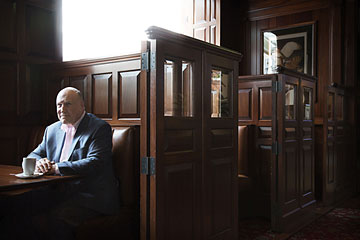
(3 of 4)
His tactics have at times divided the restaurant industry. Richard Rivera, a restaurant developer based in Sarasota, Fla., who worked with Berman at the casual-dining chain Steak & Ale in the 1970s, says of Berman, "Rick makes points and asks questions that are uncomfortable. That's a good service. Not everyone agrees. People wish he would disappear both in and outside the industry. A lot are glad he's there. We--the businesses--don't do a very good job of telling our story."
Berman has been publicly railing against the very idea of a minimum wage since at least the late 1980s. The tablet in his firm's most recent ad is his newest talking point: the machines are coming for your job. The ad's gadget plays on the anxiety Americans feel about how new technologies might eliminate employment. "This is the first minimum-wage debate that I've seen--and I've seen a lot of them--where technology is available to start doing away with these jobs," he explains.
Berman points to the restaurant chain Chili's, which will install tabletop computer screens for ordering at more than 800 of its restaurants this year. (A Chili's spokesperson says the tablets are not designed to "replace" servers.) Berman argues that the Democrats' proposal will only accelerate the march toward automation of low-end jobs. "This will only be fully appreciated in hindsight," he says. "Technology has people pumping their own gas, getting their own boarding passes, and there's nothing wrong with that, but there is an impact on the available jobs that don't require high skills."
Sparring Partners
Of course, divisions over the effect of the minimum wage run much deeper than 30-second television sound bites. The debate among economists is surprisingly energetic. Activists and researchers on the left point to 1994 as the beginning of a sea change in the economic literature on the minimum wage. That's when David Card of the University of California, Berkeley, and Alan Krueger of Princeton examined fast-food restaurants in Pennsylvania and New Jersey before and after the Garden State raised its minimum wage. Contrary to long-accepted predictions from classical supply and demand, they found that the higher minimum wage created more jobs.
Card and Krueger have plenty of admirers--and rabid critics. In 2010, David Neumark, an economist at the University of California at Irvine, and William Wascher, an economist at the Federal Reserve Board, wrote a book called Minimum Wages that looked at two decades of research (including studies that had used Card and Krueger's approach). They found that two-thirds of the studies showed the exact opposite of the 1994 findings: that a minimum-wage hike resulted in job losses.
Neumark and Card, who have become intellectual enemies, both make it seem as though there isn't much credible evidence against their points of view. "Most evidence still shows disemployment. Not all of it. But not all evidence shows there is man-made climate change either," Neumark tells TIME. "There's all kinds of reputable scientists out there who say there's no climate change," Card counters. "No amount of evidence is going to change their opinion. They can always look at any studies and put up an interpretation that matches their worldview."
